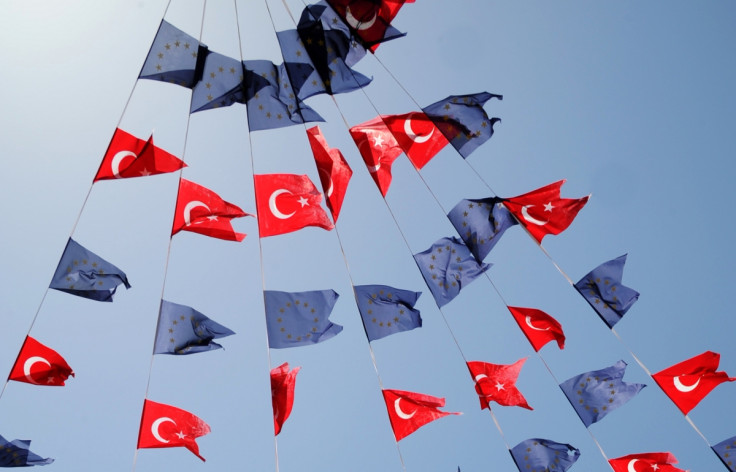Turkey wins EU membership talks boost and €3bn aid package to help tackle migrant crisis

The European Union, which has been dragging its feet over offering Turkey membership into its exclusive bloc, has been forced to "re-energise" Ankara's accession process in exchange for its help in stemming the influx of migrants. Turkey has been a candidate for the EU since 1999 and has been negotiating for accession since 2005.
The EU has been forced to pencil in target time-frames for certain accession talks as well as to the lifting of visa requirements for Turkish citizens in the Schengen zone. That is not all. The bloc has promised to provide an initial €3bn in additional resources to help deal with the migrant crisis.
The bloc, which has often raised Turkey's human rights and democracy as an issue in the past, has decided to close an eye to recent developments in Ankara. Two senior Turkish journalists at an opposition newspaper have been arrested and a prominent Kurdish lawyer Tahir Elci was murdered over the weekend.
Ahmet Davutoglu, Turkey's prime minister described the summit as a "new beginning" in relations that would help ensure Turkish membership of the bloc was "not a dream but a reality." The FT noted that the EU's "willingness to suppress its growing fears" over Turkey's political stability and the "authoritarian tendencies of President Recep Tayyip Erdogan reflects the high premium placed on Ankara's co-operation."
In the meeting of heads of governments with Turkey, the parties agreed, among others, the following with regards to Turkey's application to become a EU member:
- EU-Turkey readmission agreement will become fully applicable from June 2016;
- launch formal negotiations for upgrading the Customs Union towards the end of 2016 after the completion of preparatory works;
- The European Commission commits to complete in the first quarter 2016 the preparatory work for the opening of a number of chapters;
- launch a High Level Economic Dialogue Mechanism in the first quarter of 2016 to further enhance economic relations and create a business platform to bring business circles together;
- both the EU and Turkey have agreed to have regular Summits twice a year to assess the development of Turkey-EU relations and discuss international issues. There will also be comprehensive regular political dialogues at Ministerial/High Representative/Commissioner levels;
- target to lift visa requirements for Turkish citizens in the Schengen zone by October 2016 once Turkey fulfils the Visa Roadmap benchmarks vis-a-vis all participating member states. The commission will present the second progress report on Turkey's implementation of the roadmap by early March 2016; and
- hold the second meeting of the High Level Energy Dialogue and Strategic Energy Cooperation in the first quarter of 2016 to exchange information on energy cooperation at the global and regional levels. The first meeting was launched in Ankara on 16 March this year.
Turkey which hosts more than 2.2 million Syrians, has so far spent $8bn on Syrian refugees. Reports estimate that the monthly cost of sustaining 25 camps at over $2m.
The Hurriyet Daily noted that although Gulf states have denied accusations that they have not provided assistance or offered resettlement, figures are not readily available as they are "politically sensitive." It also slammed high-income countries like Japan, Singapore and Russia for not offering resettlement places for these refugees.
Turkey, in fighting a tough battle to win the above concessions, agreed, in turn to help the EU tackle the recent influx of migrants from war-torn countries from both the Middle East and Africa. They have agreed to the following, among others:
- the EU to provide an initial €3bn in additional resources which will be reviewed, given the developing situation;
- both parties have agreed to activate the Joint Action Plan that had been agreed on 15 October to step up cooperation for Syrians under temporary protection and migration management;
- Step up cooperation, with immediate effect, on migrants who are not in need of international protection, preventing travel to Turkey and the EU. This includes establishing a bilateral readmission provision that will "swiftly return" these migrants to their countries of origin;
- take decisive and swift action to enhance the fight against criminal smuggling networks; and
- the EU and Turkey reaffirm the fight against terrorism remains a priority;
But both parties have agreed that there should not be expectations that the migrant problem is now resolved. Speaking before the summit, European Council President Donald Tusk warned against "naive" expectations that Turkey alone will solve Europe's crisis, saying the bloc "cannot outsource" border control.
Similarly, Davutoglu made it clear that there could not be guarantees that refugee flow into Europe will fall. "Nobody can guarantee anything. I wish I could say the numbers will decline but I cannot because we don't know what will happen in Syria."
© Copyright IBTimes 2025. All rights reserved.






















